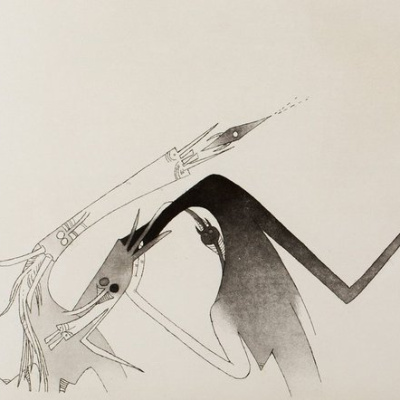Tuesday, 22.11.2022, 19.00
Johann-Offner-Straße 13, Wolfsberg, Austria
Public lecture by Jackqueline Frost as part of the public programme of the IZK excursion How Does One Get to Own a Mountain?
Cuban artist Wifredo Lam’s artist books, particularly those from the 1960s and 1970s, are only available in the rare book rooms of elite libraries or in his family’s archive in Paris. Due to the scarcity of these documents, Lam’s artist books represent an alternative archive, one that bears witness to little-known collaborations, especially with French poets. Upon examination, these image-text archives reveal more than just modernist poetry and engravings. Lam’s trilogy of artist books made with Ghérasim Luca (Apostroph’ Apocalypse 1967), André Pieyre de Mandiargues (Croiseur noir 1972), and René Char (Contre une maison sèche 1975) interrogate the themes of nuclear arms and terrestrial annihilation. The trilogy does so by juxtaposing two different ends of the world: the end of the colonial world through decolonization and the end of terrestrial life in nuclear war. By reading one of these works, Contre une maison sèche, in continuity with late 1960s anti-nuclear struggles—such as the nuclear imperialism of uranium mining in the Congo—, Frost showed how Lam’s artworks illuminate the transformation of landscapes through nuclear weapons systems. For Lam and his collaborators, the threat of nuclear destruction transforms the meaning of the Earth, as the Earth’s relation to a “post-atomic” humanity heralds an apocalyptic vision of planetary crisis. Through these connections, Frost suggests that we think formal decolonization and anti-nuclear ecology together as a point of historical reference for the current ecological crisis. What she calls “the rumor of the Earth,” after Lam’s 1950 painting, names the possible but as-yet undiscovered forms of inhabiting the Earth and of making new relations at all levels of the general ecology.
Dr. Jackqueline Frost is Teaching fellow in International Politics at the University of London Institute in Paris, and a member of Groupe Aimé Césaire (ITEM-CNRS/ENS), where she conducted postdoctoral research. Frost’s research centers on the political and aesthetic theory produced by militant intellectuals between France and the Caribbean from the Second World War until the end of formal decolonization (c. 1940-1980). With a focus on the transatlantic circulation of ideas, she explores links between politics, philosophy and cultural production using methods drawn from intellectual and cultural history, as well as cultural studies and political philosophy. She has published on topics such as anti-nuclear and ecological struggles during the Global Cold War, the cultural policy of the Cuban Revolution and the Tricontinental, C.L.R. James and the London-based Caribbean Artists Movement, dramatic representations of the Haitian Revolution, gay liberation politics during decolonization, the poetics of antifascism in late imperial France and on Haitian socialist realism in the Third World communist movement. In collaboration with Jorge Lefevre Tavárez (Universidad de Puerto Rico), she is editing the first anthology of Haitian Marxist theory in English translation for the Historical Materialism book series. Fost’s new project, “Nuclear Imperialism and Afro-Caribbean Ecology,” examines how Caribbean societies in the midst of decolonization were influenced by the world-shaking threat of nuclear disaster. This research links nuclear imperialism, terrestrial apocalypse and decolonial ecology by interrogating the Cold War political aesthetics of Jamaican philosopher Sylvia Wynter, Cuban artist Wifredo Lam and Martiniquan poet-playwright Aimé Césaire.
